
Heavy-duty trucks, as significant sources of tailpipe pollutants and carbon dioxide emissions, play a crucial role in the transition to zero emissions in transportation. In addition to meeting policy targets, enterprises are increasingly concerned about the carbon emissions and cost-effectiveness of new energy heavy-duty trucks. In this context, the China Clean Transportation Partnership (CCTP) organized the 23rd salon under the theme " Empowering Scientific Decision-Making for Enterprises, with a Focus on the Accounting Method for Cost Reduction and Efficiency Improvement in New Energy Heavy Trucks." This article summarizes and organizes the discussions among the participating experts on relevant issues during the session.
More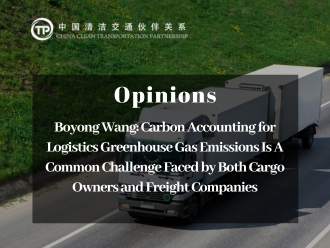
On the afternoon of September 7th, the China Clean Transport Partnership (CCTP) successfully held the 23rd salon— Empowering Scientific Decision-Making for Enterprises, with a Focus on the Accounting Method for Cost Reduction and Efficiency Improvement in New Energy Heavy Trucks. Boyong Wang, China Director of the Smart Freight Centre, was invited to attend the salon and gave a keynote speech on "Carbon Emission Calculation Reporting and Certification Framework in the Logistics Sector." This article summarizes and organizes Boyong Wang's opening remarks.
More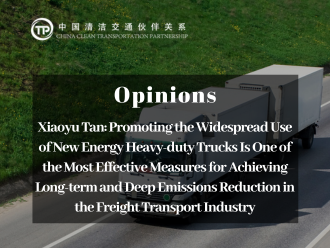
On the afternoon of September 7, the China Clean Transportation Partnership (CCTP) successfully held the 23rd CCTP salon— Empowering Scientific Decision-Making for Enterprises, with a Focus on the Accounting Method for Cost Reduction and Efficiency Improvement in New Energy Heavy Trucks. Tan Xiaoyu, Senior Engineer at the Institute of Environmental Resources of the Transport Planning and Research Institute of the Ministry of Transport, was invited to attend the salon and delivered a keynote speech on "Current Situation and Trends of New Energy Heavy-duty Truck Development." This article summarizes Tan Xiaoyu's opening remarks.
More
In the inaugural dialogue program hosted by CCTP, Ying Liu, Executive Deputy General Manager of Beijing Jiaoyan Urban Transportation Technology Co., Ltd., provided insights into the concept of MaaS, presented Beijing's pioneering approaches, and offered a glimpse into the forthcoming evolution of MaaS. In the subsequent Q&A segment, Liu Ying engaged in a thoughtful discussion with Hewu Wang, Director of CCTP Executive Committee and Director of the Zero Carbon Transportation Research Center at the Institute for Carbon Neutrality, Tsinghua University. Together, they delved into pertinent subjects and addressed queries from the audience.
More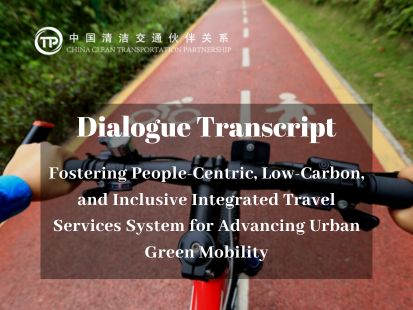
On the morning of August 15th, 2023, CCTP inaugurated its inaugural dialogue program centered around the theme "Harnessing MaaS for Urban Green Mobility Enhancement." The event was presented via a live broadcast on the CCTP channel, featuring Ying Liu, the Executive Deputy General Manager of Beijing Jiaoyan Urban Transportation Technology Co., Ltd., and Chief Engineer of Beijing Transportation Research Institute, as the esteemed guest speaker. During the session, she expounded upon the concept of Mobility as a Service (MaaS), delving into Beijing's innovative implementations in this sphere, and offering insights into the forthcoming trajectory of MaaS development.
More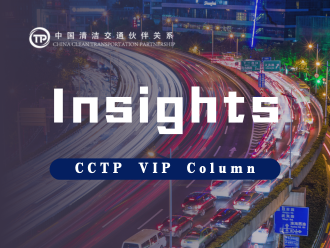
Electric vehicles have entered a new stage of large-scale industrialization, with an estimated ownership of over 100 million vehicles by 2030. The popularity of new energy vehicles is driving comprehensive electrification in transportation and a significant expansion of the energy storage industry, which is a crucial component of new energy. Achieving the peak of carbon emissions in transportation will compel a deep integration and coordinated development of battery carbon footprint and energy decarbonization.
More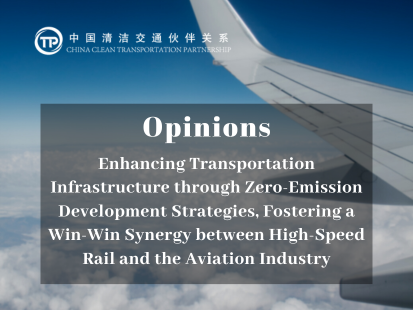
Amidst the pursuit of the concurrent objectives encompassing "carbon peak and carbon neutrality," high-quality development, and an enhanced quality of life, how will the landscape of demand and supply within high-speed rail and civil aviation passenger transport services transform? What implications and significance lie within the adjustments to the transportation framework? How can the sectors of high-speed rail and civil aviation foster a symbiotic relationship of robust cooperation and competition, ultimately leading to a "win-win" outcome? Given the array of queries outlined above, the assembled experts engaged in profound and comprehensive deliberations during the 22nd CCTP Salon, delving into these multifaceted subjects.
More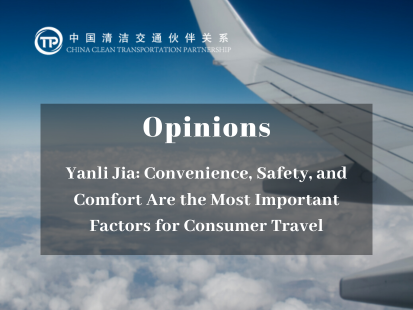
Exploring the passenger demographics willing to make the shift from air travel to high-speed rail, and understanding the motivations driving this change, were the central inquiries under consideration. Addressing these questions, the 22nd CCTP Seminar held on the morning of July 25th featured the theme "A New Approach to Aviation Emission Reduction: Bridging the Gap between Short- and Medium-Haul Air Travel and High-Speed Rail." At this seminar, Yanli Jia, Senior Research Director at Beijing Ipsos Market Consulting Co., Ltd., delivered an insightful presentation on the topic of "Consumer Inclination to Substitute a Portion of Air Travel with High-Speed Rail." Her talk encompassed an exploration of consumer travel behaviors, the willingness to transition from air to high-speed rail, and the key factors influencing this transition, approached through both the lenses of business travel and personal leisure.
More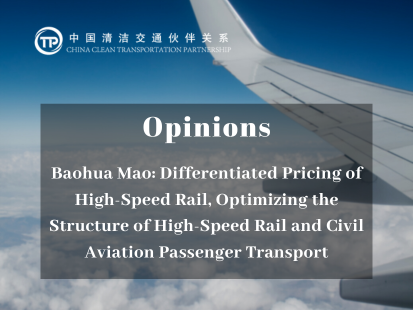
In the morning of July 25th, the 22nd CCTP Salon Seminar titled "A New Approach to Aviation Emission Reduction: Exploring Short- and Medium-Haul Passenger Aviation's Interaction with High-Speed Rail" was successfully conducted by CCTP. The distinguished presence of Baohua Mao, Executive Director and Professor at the School of Traffic and Transportation, Beijing JiaoTong University, graced the seminar, wherein he also presented a keynote speech. The focus of his discourse was the "Study on Optimization Strategy of High-Speed Rail and Civil Aviation Travel Structure under Dual-Carbon Targets."
More
With current subsidies phased out, the preferential purchase tax for new energy vehicles and the differentiated license plate policies in major cities like Beijing, Shanghai, Guangzhou, and Shenzhen play a crucial role in reducing the green premium for these vehicles. How long should the preferential purchase tax policy be in effect? When should it be phased out, and what preparations need to be made for the exit? These questions merit in-depth exploration.
MoreCCTP is a non-governmental, non-profit, and voluntary platform, focusing on policy and technological innovations, summarizing and disseminating national and global practices for a net-zero transportation sector.